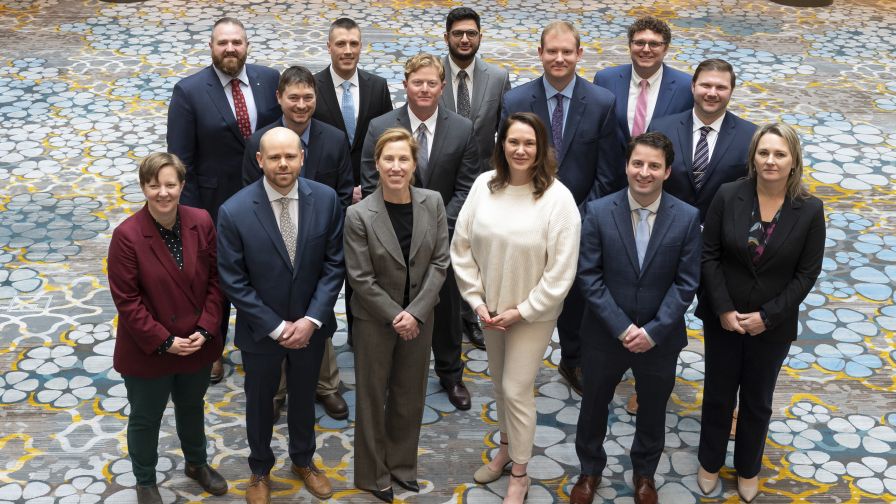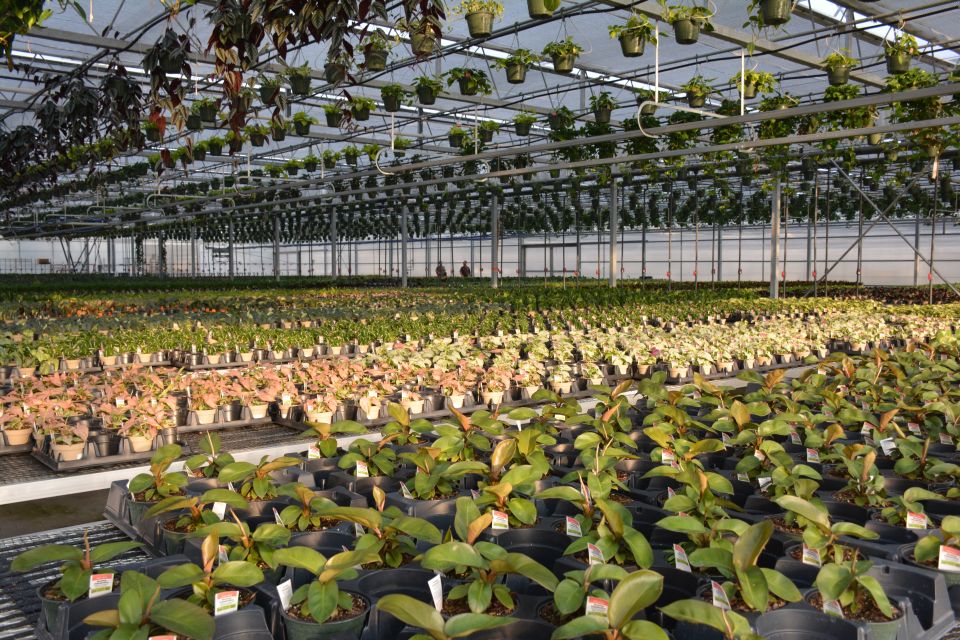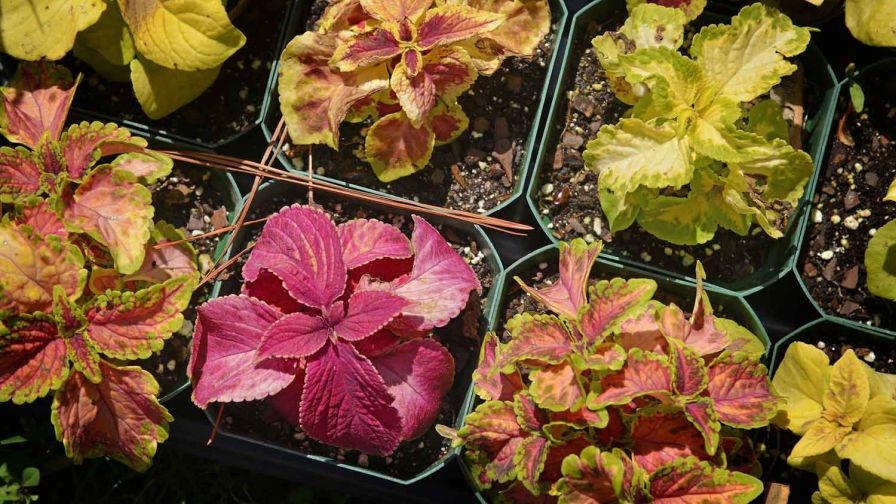How the HRI Leadership Academy Is Developing the Next Generation of Floriculture

The HRI Leadership Academy Class of 2023 is seen here during a visit to Washington, DC to meet with federal legislators. Photo: AmericanHort
In an era where many baby boomers are retiring, the next generation of leaders is critical. In some cases, a family business can be passed on to the children. In other cases, there might not be a younger person to take over a leadership role. The horticulture industry is working to fill in those gaps.
Jennifer Gray, Research Programs Administrator for AmericanHort, says the idea of a leadership academy for horticulture was in the works before the COVID-19 pandemic began. With the onset of the pandemic, AmericanHort put its plans on hold. But when the right time came along, Gray says it made sense for the Horticultural Research Institute (HRI) to partner with AmericanHort to bring together leaders from all over the country.
“From an HRI perspective, we held a research roundtable several years ago. We looked at the components of what a healthy, vibrant industry would look like,” Gray says. “One of the hallmarks of a vibrant, healthy industry was connected leaders throughout the industry, regardless of segment, business size, or region. People could come together and discuss industry issues. At that time, HRI did not have a method to accomplish that.”
HRI partnered with AmericanHort to officially launch the Leadership Academy in the summer of 2022, and the first class graduated at Cultivate’23. There are two overarching goals of the academy. One is leadership development, such as increasing self-awareness, learning skills to manage a team, and how students can capitalize on their strengths. The other goal of the HRI Leadership Academy focuses more on business. Leaders should have a solid understanding of fundamental business concepts, Gray says.
“Leaders come in all different shapes and sizes. There’s not a one-size-fits-all leadership template,” she says. “We want to encourage the students who come through this program to understand where their strengths are and understand that they can build upon those strengths and become really effective leaders who positively impact their businesses, communities, and the industry.”
Students Dive Deep on LEAD Project
The HRI Leadership Academy class, which will be around 12 students each year, is spread out all over the country. The academy offers a mix of in-person events, webinars, and homework assignments, such as reading books and articles.
There were four in-person events throughout the year, and each retreat focused on a new topic. Matt Foertmeyer, Owner and Growing Operations Manager of Foertmeyer & Sons Greenhouse in Ohio, is a member of the inaugural HRI Leadership Academy Class of 2023. He says the class traveled to Colorado, Georgia, Washington, DC, and Ohio.
Before the first meeting, students took a personality test to learn about communication, says Denise Mullins, Director of Product Innovation at Smith Gardens in Washington, and a graduate of the inaugural leadership academy class.
 “Before the first day in Denver, we had to come prepared with a personality test about how you think, such as whether you are more analytical, emotional, or conceptual,” she says. “With that test, we learned fast how each of us communicates.”
“Before the first day in Denver, we had to come prepared with a personality test about how you think, such as whether you are more analytical, emotional, or conceptual,” she says. “With that test, we learned fast how each of us communicates.”
The class was separated into LEAD groups to work on a year-long research topic of their choosing, Gray says. LEAD is an acronym for (L)earn and research an issue, (E)ngage with a team, (A)dopt a position, and (D)eliver upon their recommendation. Groups chose topics relevant to the horticulture industry, including e-commerce, labor, and sustainability. Each group presented their findings to the HRI and AmericanHort boards at Cultivate.
The LEAD research projects were intense, but well worth it. Although both applied for the academy and were very excited to join the class, Mullins and Foertmeyer were nervous about the additional workload on top of their full-time jobs and volunteer work within the industry.
“You still have to find ways to get your work done. You’re staying late, working from home, and working during vacation days. But the curriculum was put together really well,” Foertmeyer says. “I thought it was a lot of work, but there’s nothing more important that I could be doing with my time right now. This is making me invest in my future and develop myself as a leader.”
Mullins says everyone came together with a common goal and supported each other.
“You’re part of a team who are all trying to uplift each other,” she says of her classmates. “We’re all in it for the same reason, so we had good camaraderie.”
How-To on Advocacy
Gray says one of the hallmarks of the HRI Leadership Academy is developing the leaders of tomorrow. The academy is for people who have been working in the industry for seven to 10 years and want to help shape the future. To shape the future of horticulture, there is undoubtedly some interaction with various levels of government and agencies, such as the EPA. On a trip to Washington, DC, students learned that advocacy might be a little easier than they thought.
“They made it very clear how easy it is to be involved. Where there’s a will, there’s a way,” Mullins says. “They gave us a basic road map of how to initiate groups within our community or region with other growers and agricultural workers and advocate for our own regional issues. It was very cool.”
Foertmeyer was excited to have 1-on-1 conversations to address industry challenges.
“I got to speak to an individual from the EPA about specific issues I’ve had as a grower about how they label chemistries in the industry. I would have never had that oppor-tunity if I wasn’t in this leadership academy,” Foertmeyer says, adding that they have already exchanged several emails.
The Benefits of Networking
Gray says the first class of the HRI Leadership Academy gave their stamp of approval in the form of a gift. The inaugural class created a permanently endowed fund within HRI to fund the academy, speaking volumes to their experience with the leadership program.
As the horticulture industry is undergoing a generational transfer, Gray says it is essential to identify and develop successors and create a peer-to-peer network to collaborate and solve problems.
“This was not a group of quiet people. At the beginning, I questioned how interactive it would be. But this was an outspoken group,” Mullins says. “It was great because there was no issue about asking questions or saying you don’t understand something. It was a very open space. That’s what made it really great, on top of the fact that everyone was willing to share. It also came about pretty fast that everyone would poke at each other and we would make jokes.”
Foertmeyer agrees, saying that these relationships will last a lifetime.
“The group we were part of was incredible. They are the type of people that I will have a friendship with for my entire career and my life,” Foertmeyer says. “You have such an opportunity to bond with these people and build relationships. The biggest takeaway was how impactful it was to interact with people you don’t know, but you have the same career and life goals.”
Anyone interested in the HRI Leadership Academy may apply online at hrileadershipacademy.org by Feb. 9.









